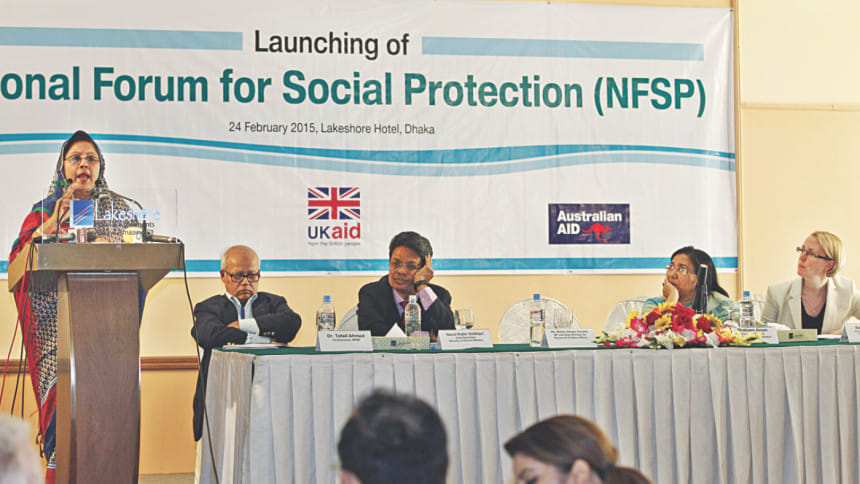Extreme poor still too many despite reduction success

- Poverty rate 24pc
- Extreme poor 2.6cr
- People under safety net 8.8cr
Extreme poverty in the country is still very high with 2.6 crore people living below the poverty line, said the director general of Department of Disaster Management and Relief yesterday.
The situation prevails though the government has halved poverty from 48 percent over the past five years with various social protection schemes, Mohammad Abdul Wazed told the launch of National Forum for Social Protection (NFSP), first of its kind in the country.
The forum will take the views of the grassroots people for required policy reforms so as to make the safety net programmes more efficient, transparent and accountable.
Around 8.8 crore people are presently covered by the safety net schemes, said Meher Afroze Chumki, state minister for women and children's affairs. Yet 24 percent of the country's 16 crore population is poor, she added.
Manusher Jonno Foundation (MJF) that works for human rights and good governance organised the launch of NFSP with support from UKAid and AusAid, at a local hotel.
Joint Secretary to Ministry of Social Welfare Nurul Kabir Siddiqui said the government was conducting a total of 121 safety programmes with as many policies through 21 ministries.
All these schemes will be brought under a single authority, he said, adding that NFSP would help institute a mechanism to address local grievances against the programmes.
Dr Syed Jahangir Haider, team leader of a recent study on 10 social protection schemes, while presenting the preliminary findings, said 84 percent of the 2,704 respondents reported that the selection of beneficiaries was not done transparently.
A significant portion complained of political consideration in the selection process, he said, while many people were found unaware of the services and of the authorities where to report anomalies.
Haider said female Union Parishad members were ignored in beneficiary selection, and neither the union nor the upazila parishads did maintain a complete database of households eligible for social safety benefits.
Though the government mobilises huge resources for such schemes, there are potential obstacles in their implementation, said Shaheen Anam, executive director of MJF.
Bangladesh spends around 2 percent of its GDP for social protection purposes, which in the fiscal 2013-2014 was Tk 26,700 crore reaching 7.7 crore people, says an MJF release.
The NFSP is comprised of 44 renowned independent researchers, think tanks, and civil society bodies working on social safety, with Rasheda K Choudhury, executive director of Campaign for Popular Education, as convener and Shaheen Anam as co-convener.
The MJF will be the secretariat of the forum.
With the financial support of UKAid and AusAid, the finance ministry and DFID Bangladesh are conducting a five-year (2013-17) project titled "Strengthening Government Social Protection for the Poor (SGSP)" for reforming the social safety system, a tool of poverty alleviation.
The MJF is implementing one component of the SGSP fashioned "civil society", under which NFSP has been created.
Sarah Cooke, country representative of the Department for International Development (DFID) Bangladesh, and Dr Tofail Ahmed, co-convener of the forum, also spoke.

 For all latest news, follow The Daily Star's Google News channel.
For all latest news, follow The Daily Star's Google News channel. 



Comments